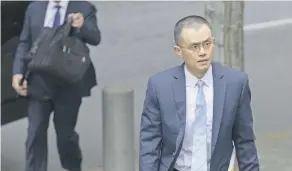Changpeng Zhao highlights disparity in justice for corporate misconduct in U.S., sparking debate on accountability
Last week, cryptocurrency mogul Changpeng Zhao, founder of Binance, made headlines in his first public appearance since serving a four-month prison sentence in the U.S. for his company’s violations of anti-money laundering (AML) laws. Addressing attendees at a crypto conference in Dubai, Zhao drew comparisons between the treatment of his company and the recent legal troubles faced by Canada’s Toronto-Dominion (TD) Bank, which has also been embroiled in a money-laundering scandal yet has seen no executives face jail time.
Zhao’s prison sentence followed a hefty US$4.3 billion fine against Binance for failing to implement sufficient AML protocols, marking one of the highest corporate penalties in U.S. history. While Zhao’s criminal conviction is a rare outcome in corporate malfeasance cases, he contends that Binance’s missteps were no more egregious than those of TD Bank, which recently pled guilty to conspiracy to commit money laundering. Zhao highlighted the perceived discrepancy in a response to questions at the conference: “I can give you a couple of data points for people to benchmark,” he said. “We failed to implement an adequate anti-money-laundering program. … I’m the only one who went to jail for this in U.S. history.”
According to Zhao, despite TD Bank’s recent admissions, not a single executive from the Canadian financial giant has faced personal accountability or even public scrutiny from authorities. “No one was named. Just the company was fined,” Zhao noted, implicitly raising the question: why did he alone face incarceration, while TD executives remain unaffected?
Zhao’s comments come amid ongoing U.S. Department of Justice (DOJ) investigations into TD Bank. While Attorney-General Merrick Garland has assured the public that investigations are progressing “aggressively,” whether they will result in charges against high-ranking executives remains uncertain. So far, the probe has only implicated two lower-level TD employees, prompting critics to question the scope and efficacy of the accountability efforts.
Massachusetts Senator Elizabeth Warren recently weighed in, penning a letter to the DOJ urging further action. “Until and unless those executives who presided over TD Bank’s institutionalized money laundering are held accountable, banks will continue to factor enforcement fines into the cost of doing business, rather than approaching compliance with our money laundering laws with the seriousness it requires,” she wrote. Known for her calls to reform large financial institutions, Warren argues that systemic issues persist because companies perceive fines as merely the cost of doing business.
For Zhao, this comparison goes beyond self-interest. He cited statements from the DOJ made during both investigations and noted the striking similarities between criticisms of Binance and TD. In one such instance, the DOJ stated that “the company chose profits over compliance with the law – a decision that is now costing … billions of dollars in penalties.” In another instance, a compliance employee reportedly mocked TD Bank’s laxity, saying, “Lol. Easy target.” These statements, according to Zhao, reinforce his argument that systemic misconduct across corporate lines often results in disparate consequences for their leaders.
Zhao and his critics also point to the gravity of offenses that sparked the DOJ’s fines and sanctions. In Binance’s case, funds allegedly reached illicit actors, including terrorist networks, cybercriminals, and traffickers. However, Zhao notes that TD Bank’s AML violations similarly enabled drug traffickers and other criminal entities to launder hundreds of millions. “If we boil down what Binance and TD did,” Zhao argued, “it’s hard to tell the difference.”
In addition to AML breaches, Binance was also charged with violating U.S. sanctions, adding a layer of complexity and severity to its case, whereas TD Bank’s case was limited to drug trafficking-related transactions. Still, Zhao’s supporters argue that a fair system would hold executives across the board to equal standards, regardless of the nature of the illegal transactions.
“I’m not saying any TD executive needs to go to jail like Mr. Zhao,” one observer commented. “But the questions are warranted: was Binance’s outcome too harsh, or was TD Bank’s too lenient?” With public debate now intensifying around these high-profile cases, the DOJ and other regulatory bodies may face mounting pressure to ensure uniformity in the enforcement of AML laws.
As the crypto industry and traditional banking giants alike reckon with the regulatory scrutiny of recent years, Zhao’s case may set a new precedent—or at least, it might encourage closer examination of who is held accountable when compliance failures allow criminal money to flow unchecked.

